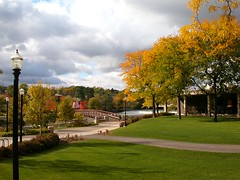To answer a question I previously posed, the property in question is not in the city, and the vote is in fact on the question of annexation. So if the city doesn't annex it, maybe there is some risk that the property could be annexed to South Elgin via an annexation corridor, which would deprive Elgin both of control and revenue. I don't know, however, if this is a real risk or just conjecture.
In any case, it's clear that there's some strong opposition to Wal-Mart occupying that site, and the objection is based purely it seems on the impact it would have on Elgin's image. This is more on account of opportunity cost--forfeiting the possibility of a Commons--than on Wal-Mart's perceived negative image.
In terms of immediate financial impact, the Wal-Mart proposal is likely superior to most other options, including a Commons. The
Courier today described how sales per square foot at Geneva Commons is much lower than what is projected for Wal-Mart (
read the article). But because of externalities, the broader financial impact is much less certain. Those who oppose Wal-Mart may argue convincingly that having a Wal-Mart on that site, as opposed to a Commons, will in the long run dampen any appreciation of property values on the far west side. Proximity to an upscale lifestyle center (Elgin Commons) it can be argued will enhance property values. And this increase in property value, along with other externalities--many not directly measurable, may in fact result in an economically superior option to that offered by Wal-Mart.
But this is admittedy an academic argument, because nobody is offering to build an Elgin Commons. If Elgin holds out for an upscale development for a period of ten years, it would forfeit about $14M (present value) in tax revenue. Depending on what you believe, that may be a price worth paying.
Perhaps there is still room for negotiation and compromise. Such a compromise might result in Sam's Club taking over the available space in the Otter Creek Shopping Center (
map) and Wal-Mart taking over the space on Summit next to Jewel. The existing Wal-Mart on Randall would remain. Infill development is always a superior option, so this would be a great outcome for Elgin. Wal-Mart would get a chance to expand on Elgin's east side, where there's a significant market. And Sam's Club would possess an ideal location at the intersection of Randall and Route 20.
